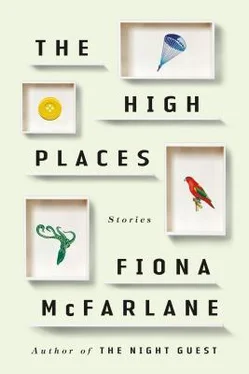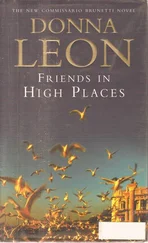Mr Ronald’s eyes opened and Sarah drew back from his face. They studied each other. His eyes were yellow at the edges. They were clever and lucid. They looked at Sarah with calm acceptance; they looked at the windscreen, shattered but half in place, and at the close proximity of the tree.
‘I’ve had an accident,’ he said.
‘Yes, you have. How do you feel? Stay still,’ said Sarah. She felt composed. Everything she did felt smooth and immediate.
‘I’m all here,’ said Mr Ronald. ‘Everything’s attached, at least.’ He gave a small laugh. ‘It happened so fast, as they say. I see I’ve hit the tree.’ He said ‘the tree’ as if there were only one tree in the whole country; as if he had always known he would hit it.
‘Good of you to stop,’ he said.
‘Of course!’ cried Sarah.
‘Plenty wouldn’t. Decent of you. I don’t suppose he even thought for a minute about stopping.’
‘Who?’ asked Sarah. She looked into the back of the car in panic, as if there might be someone else crushed inside.
‘The lout who swiped me.’
Sarah remained quiet. Then she said, ‘My husband’s gone to find help.’
She had been waiting to use this phrase: ‘my husband’. Her first time.
‘Ah,’ said Mr Ronald. ‘I don’t suppose you happen to be a doctor. That would be convenient.’
‘Not a human doctor,’ said Sarah. ‘An animal doctor, though.’
‘My leg, you see,’ he said. ‘I think it should hurt, but at this moment it doesn’t.’
‘You’re probably in shock.’
‘You’re not British, are you. Antipodean.’
‘Australian.’
‘I thought so, but didn’t venture it. From the first few sentences you might just as well be a New Zealander.’
He pronounced it ‘New Zellander’.
‘No, no!’ Sarah protested. ‘We sound completely different.’ She demonstrated the difference: ‘Fish and chips,’ she said. ‘That’s us. This is a Kiwi: fush and chups.’
‘Nonsense,’ said Mr Ronald. ‘No one speaks that way at all.’
Sarah felt chastised. She didn’t resent it — there was something pleasantly authoritarian about Mr Ronald, who made her think of a school principal driving home from church, or the father of a boyfriend, to whom she must be polite at all costs.
‘A veterinarian,’ said Mr Ronald. ‘Dogs and cats.’
‘Actually I specialise,’ said Sarah. ‘Exotic animal medicine. But dogs and cats too, sometimes. Mostly for friends.’
‘What counts as exotic these days?’ asked Mr Ronald. His right hand moved slowly over his chest and toward his legs, testing for pain and damage.
‘Chinchillas,’ said Sarah. ‘Ferrets. Hermit crabs. Monkeys.’
‘Monkeys?’ said Mr Ronald. ‘Good god. Does anyone in England actually own a monkey?’
‘You’d be surprised.’
‘And is it legal?’
‘I’m afraid it is.’
‘And people will spend hundreds of pounds to cure a hermit crab?’
‘People become very attached to their pets,’ said Sarah. She had defended her clients on this subject before, at parties and college dinners, and whenever she did she saw them all in the surgery waiting room, bundled against cold and worry, holding cages and carriers and shoeboxes with holes punched in them.
‘Yes, you’re right,’ said Mr Ronald, and he thought about this for a moment. ‘Dogs I understand, and cats too, in their own way. I grew up with a bull-mastiff. He could knock me down until I was eleven, and then I could knock him. He ate the leg off a rabbit once.’
The bull-mastiff walked through Sarah’s mind. Hip dysplasia, she thought. Hypothyroidism. A heavy dog. She’d need help lifting it.
‘And you’ve treated a monkey yourself? You seem very young.’
‘A capuchin once, with a broken leg.’
This mention of a broken leg seemed to remind Mr Ronald of his situation. His face altered in pain.
‘Do you feel it now?’ asked Sarah. The skin whitened around his mouth and he let out a sound that reminded her of a tiger, a long and drawn-out ‘ooow’.
‘It won’t be long,’ she said. ‘My husband will be back soon.’
She looked out of the window. The road was dark in both directions and overshadowed with trees. There were shapes in the trees. They looked like small crouching monkeys escaped with their rotten teeth and cataracts from backyard sheds all over England. When she looked back at Mr Ronald, he seemed to have recovered a little. He laid his head against the seat and breathed quietly. A band of sweat bound his forehead. She placed her fingers on his wrist: his heartbeat was steady now, and slow. She kept her hand where it was, despite feeling revolted by the dampness of his old skin. They sat together listening for cars. Someone will come in this minute, thought Sarah; but the minute passed.
‘A capuchin, you say,’ said Mr Ronald. ‘A kind of monk, isn’t it?’
‘Well, a monk, yes, I think so. But also a kind of monkey.’
‘I saw an orangutan in the Berlin Zoo once, painting on the wall with a dish brush. Looked just like my wife cleaning the shower. But here Douglas is, against primate testing. I can’t go in for that. Douglas calls me species-ist.’ Sarah decided not to ask who Douglas was. ‘If they cure Parkinson’s, then it’s worth those gorillas, I think. Not a popular stance, I’m told. I myself can’t stand vegetarians.’
‘I’m a vegetarian,’ said Sarah.
‘Well, in the abstract. It makes sense for someone like you. A veterinarian. Why heal them and then eat them? But I always say vegetarians ought to eat meat when it’s served to them. Imagine being a guest in someone’s home and turning down food that’s offered.’
This reminded Sarah of her grandfather: perplexed and indignant, having survived a war, to find that people cared about other kinds of suffering. Food might run out — eat what you’re given. Life might be lost — don’t mind the monkeys. Sarah liked to argue on this topic, calmly maintaining her position, but in this case she would not.
‘Oh, but I’m sure you’re a charming guest,’ said Mr Ronald. ‘And here you are, helping an old man in distress.’
He chuckled and the pain came again — stronger, it seemed, this time. It lifted him from the seat a little, and the lifting caused more pain. He shut his eyes against it. Sarah waited for this to pass, as it had the last time, and when he was quiet she asked, ‘What can I do? Anything? Is it your legs?’
He laughed again, sucking in his cigarette breath, and moved his wrist away from her hand. The rain grew heavier and the trees on the road began to move their monkey arms. The damp fields gave up their deeper smells of mice and manure. No cars passed by. Sarah worried about David in the rain. He couldn’t have been gone for longer than ten minutes, she reasoned; perhaps fifteen. She wondered briefly if the woman was still ironing in her house.
She asked again, ‘How are your legs?’
‘Funny,’ said Mr Ronald, and his breath was shorter now. It left his throat unwillingly. ‘Funny, but one of them’s not even a leg. Left leg, below the knee. Plastic.’
Sarah imagined him at other times rapping his fingers against the plastic of his leg, knocking it through his neat trousers while chatting on a bus. The war, she thought, he must have lost it in the war; she saw him and other men moving quickly over a French field. Poppies blew in the grass, and he was a young man, strong of limb, and the sea lay behind them all as they ran.
‘Diabetes,’ said Mr Ronald. ‘Didn’t know, did you, that it could take your leg off?’
Sarah shook her head, but she did know. She’d seen diabetic dogs, cats too. She’d cut off their legs. The French field fell into the sea, and the rain still fell against the roof of the car.
Читать дальше












